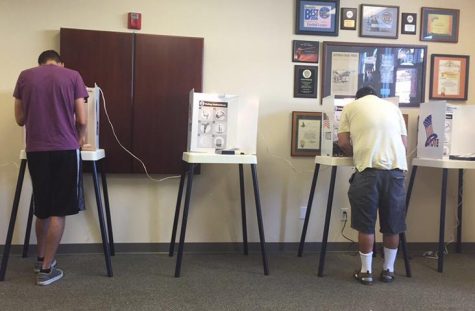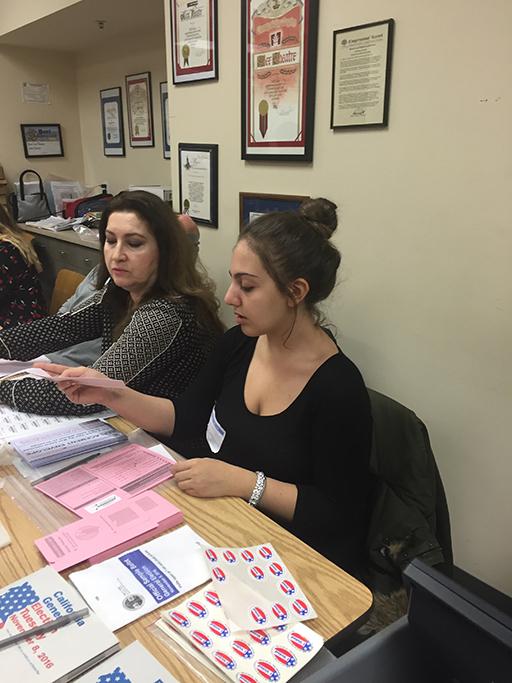Working at the polls is more complicated than it seems
Democracy in action
November 11, 2016
Christine Ohanyan sits beside her polling place’s assistant inspector on Nov. 8, filling out provisional ballots.
“People are actually voting this year? That’s a joke, dear,” said one older American citizen on Nov. 8 at 6 a.m. outside of the Glendale Arts polling location where I was volunteering as a student clerk. “I’ve seen many elections, but nothing like this.”
Glendale voters flooded into this single, small room. The next 14 hours of my life would consist of: handing out ballots, scanning ballots, crossing off names, explaining what a provisional ballot is and how it is counted, accommodating cranky voters, and receiving numerous paper cuts. Yet, even amidst the incredible amount of tedious work that I was doing, I saw in Americans for the first time in my life something that took me by pleasant surprise: devotion towards improving one’s own country.
In the American voting system, each county of every state assumes its own rules and procedures for polling. As a Californian living in Los Angeles County, my experience allowed me to directly view the rules and procedures in Los Angeles specifically. Here, every polling location consists of a table with four to five poll workers — or student poll workers who are under 18 years of age and participating in the Student Pollworker Program. There must also be one inspector, and one assistant inspector, who must be United States citizens and California residents.
These workers arrive at 6 a.m. to set up voting booths and prepare the necessary materials such as ballots and rosters, and leave at 9 p.m after the ballots have been counted, the booths have been taken apart and put into boxes, and every extra material has been organized into boxes.
Between 6 a.m. and 9 p.m., the workers accommodate every citizen who comes in to vote by first checking off their name and address to assure they do not vote twice, and then giving them a regular ballot if their name is in the community roster or a provisional ballot if it’s not.
As a student poll worker, I witnessed citizens in a rush to cast their vote in the morning before work and even on their lunch break, anxious to not be late to their jobs. This means that many of them woke up earlier than usual or spent the time that they had during a break in partaking in their country’s political affairs. Also, many of the voters who filled out provisional ballots showed great concern for whether their votes would count, asking me exactly what the difference is between a provisional and regular ballot and how these votes will be counted. This prioritization of participating in the election is undoubtedly unusual considering the fact that only 58.6 percent of eligible voters in the 2012 election actually voted, according to Vox, a figure that is generally consistent with the voter turnout throughout American history.
The 2016 election was also unusual in other aspects. Never in history have both candidates for president been so disliked, with 54 percent of voters nationwide considering Hillary Clinton unfavorable and 61 percent of them considering Donald Trump unfavorable, according to NBC News.
The inspector of my voting location, Mayuri Patel, believes there is actually a connection between both candidates’ unpopularity and the strong will of the people to have their voice heard in this particular connection. Patel said that this explains why 913 people voted in just our polling location, while, in her experience of participating in polling during the past three elections, the average number of people who come to just one polling place is about 500. “Hate means passion and motivation,” she said. “If the people hate one particular candidate a lot more than the other, it’s likely that they will dread having that person in office, and therefore come in and vote to make sure that does not happen.”
As a poll worker, I also saw a great number of young people come in to vote at my precinct, which surprised me considering that the percentage of 18-24 year olds who voted dropped from 50.9 percent to 38 percent from 1964 to 2012, according to a US Census Bureau analysis. This could possibly be a result of scandals that both candidates were involved in, one of the most definitive and bizarre aspects of this election, which went viral on every media platform including social media predominantly used by the younger generation; this includes Clinton’s scandal of using a private email server for official communication before deleting 33,000 of the emails, and Trump’s scandal of declaring a $916 million loss on his 1995 tax returns — which could have allowed him to legally avoid paying any federal income taxes for eighteen years.
According to one of the senior clerks with whom I worked at the polls, Susanna Galstyan, this is precisely the reason for young people’s sudden interest in politics. Galstyan said that her 24-year-old son voted for the first time this year mainly because Clinton’s scandals had proven her to be extremely secretive, and he disliked that enough to vote against her. “In a way, this is a good thing because it makes young people care more about the issues of their own countries, which is important since they hold the future of it,” she said. “ But at the same time, they could be misled into looking at just scandals and not actual policies. Also, if their passion becomes too strong, they might cause violence if their candidate does not win.”

My poll working experience also came with some strange encounters. One female, first-time voter was having a bit of trouble using the pen set in the booth, and asked me for help four different times. After the fourth time helping her, she insisted that I was purposefully showing her an incorrect way of using it to amuse myself, and she started crying.
Other student poll workers from Clark described strange experiences as well. Senior Marco Megerdichian said that as he was putting up a sign on a window near his precinct on Brand Blvd., the business owner of that property came out with a machete and asked him what he was doing. “He came and yelled at me that this was his property, but after I explained that it was for election polling, he said that it was all right, but still watched me until I left,” Megerdichian said. “I was terrified.”
Senior Raisa Faisal said that she also had an unusual encounter with a man who refused to sign a provisional ballot. “He was convinced his vote was not going to be counted, even after I explained to him that since he’s registered as a VBM (Vote-By-Mail), I couldn’t give him a regular ballot because then he could have been able to vote twice,” Faisal said.
Government teacher Nicholas Doom, who offered his students extra credit to participate in polling and participated as an assistant inspector himself, believes serving as a poll worker helps students learn more about their government in a meaningful way. “Poll working is a great way to give students an opportunity to contribute to their country’s affairs before they can vote,” Doom said. “It gives them a sense of belonging and allows them to see the importance of national matters firsthand.”
